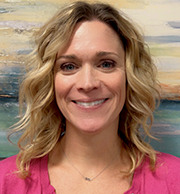
From the Chair: Supporting Success for All
By Jennifer Kirk | March 2023
 I see her walking into the counseling suite, papers sticking out of her bag, hair disheveled and head low. She’s crying. She’s in 11th grade and can’t finish her math test, she’s stuck on the third question, her OCD will not let her move on from it; she keeps checking it, rechecking it and rechecking it again. If you are attentive, you can see that she is scratching at her forearm, some self-stimulation to try and calm herself down. Guess what? She’s also in our gifted program, a year ahead of her peers in math, with a perfect math score on the PSAT. She’s made her way to the counseling office looking for me; she doesn’t know what else to do but find her trusted person, me, her champion and advocate, me, and try to work through this. Working with a twice exceptional student requires particular skills and a great deal of care; those skill sets are unique to a school counselor, the authentic and genuine mental health professional in the school building. A constant question school counselors ask both of themselves and their educational partners is, “What is the best instructional situation for this student to successfully engage in the general curriculum?” (Sailor, 2015). Counselors work with all students – every one of them – to support their academic, career and social/emotional development through the implementation of a comprehensive school counseling curriculum.
I see her walking into the counseling suite, papers sticking out of her bag, hair disheveled and head low. She’s crying. She’s in 11th grade and can’t finish her math test, she’s stuck on the third question, her OCD will not let her move on from it; she keeps checking it, rechecking it and rechecking it again. If you are attentive, you can see that she is scratching at her forearm, some self-stimulation to try and calm herself down. Guess what? She’s also in our gifted program, a year ahead of her peers in math, with a perfect math score on the PSAT. She’s made her way to the counseling office looking for me; she doesn’t know what else to do but find her trusted person, me, her champion and advocate, me, and try to work through this. Working with a twice exceptional student requires particular skills and a great deal of care; those skill sets are unique to a school counselor, the authentic and genuine mental health professional in the school building. A constant question school counselors ask both of themselves and their educational partners is, “What is the best instructional situation for this student to successfully engage in the general curriculum?” (Sailor, 2015). Counselors work with all students – every one of them – to support their academic, career and social/emotional development through the implementation of a comprehensive school counseling curriculum.School counselors, in supporting all students, will serve those with a spectrum of special needs, both formally and informally. School counselors are team members of individualized education plans (IEPs), gifted IEPs and 504 service agreements. They are members and leaders on data teams and other teams/programs supporting kids. ASCA’s Position Statements offer an abundance of guidance and resources with regard to identified exceptional student populations. Several to review include:
- The School Counselor and Students with Disabilities
- The School Counselor and Student Mental Health
- The School Counselor and the Identification, Prevention and Intervention of Behaviors That Are Harmful and Place Students At-Risk
- The School Counselor and Gifted and Talented Student Programs
- The School Counselor and Retention, Social Promotion and Age-Appropriate Placement
Schools have the mandate to provide the platform for all students to learn, and educators are responsible for meeting student needs with intervention strategies while addressing areas of struggle. The ASCA Student Standards: Mindsets & Behaviors for Student Success are organized through the lens of the “knowledge, attitudes and skills students need to achieve academic success, college and career readiness and social/emotional development” (p. 2). There is no delineation as to segregating supports based upon risk level or any demographic, but to support all students in all domains from pre-K–12 and to graduate high school for the greatest access to success. As href="https://eric.ed.gov/?id=EJ1080474" target="_blank">Harn et al. (2015, p. 16) wrote, “Rather than having teams think separately about academic and behavioral needs, we need our . . . specialists to consider the overall needs of the students, which will require better collaboration. . . as part of the overall intervention planning and evaluation process.”
Key educational partners need to come together and work toward this common goal. This returns to the question, “What is the best instructional situation for this student to successfully engage in the general curriculum?” And, further, how are school counselors taking the steps necessary to answer this question for each student? Always come back to this place and create the inclusive environment that allows for a culture and policy of care for a student’s equitable access to success.
I bring us back to my 11th grade twice-exceptional student. I see her like no one else does, and I honor her strengths and challenges, what marginalizes her and her intersectionality. I will not make assumptions about her based on how she presents or how she is identified, but know her and advocate for a scenario that allows her to access success in her academic, career and social/emotional journey. I challenge you to do the same with each of your students!
Contact Jennifer Kirk, PSCA board chair, at jkirk@uscsd.k12.pa.us.